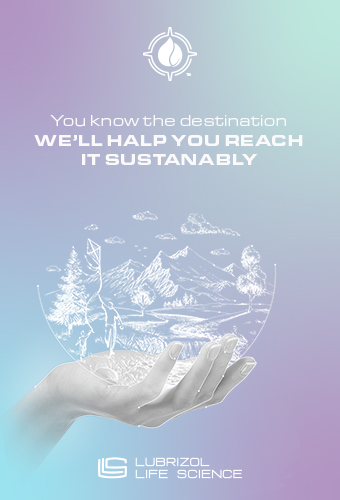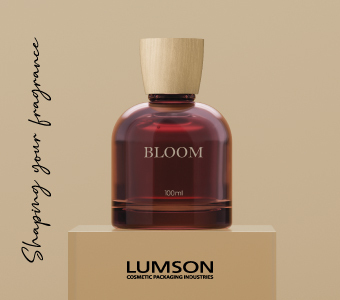When Lindsay Azpitarte launched Ulé, a brand of natural products, with the Shiseido Group in 2022, she chose a novel concept in cosmetics: ultra-local plant sourcing from vertical farming. The three flagship ingredients of the Ulé range, chosen for their ability to improve the skin’s resilience, are extracted from exotic plants grown at Tower Farm, a vertical farm located a few kilometres from Paris.
"I wanted to launch a brand centred on the values of conscious beauty. I combined my passion for urbanism and the way cities adapt, with what I wanted to do with the botanist Patrice André, which was to create a slightly different kind of naturalness where nature is closer to people," explained Lindsay Azpitarte.
Indeed, this principle of indoor cultivation, based on the precise control of all the parameters of the plant’s development is meeting in France, the expectations of brands and ingredient suppliers.
"The cosmetics industry is increasingly interested in this trend because it provides both an environmental and an innovative benefit. This technology allows us to create the perfect environment for plants, and to study them in real-time to optimize them for cosmetic purposes," added the creator of Ulé.
A controlled Sourcing
The first advantage is that the biomass required for plant extraction is readily available. "We can produce any plant all year round with no seasonal constraints. A dozen cycles are possible, whereas, in the natural environment, there is only one season. Then, the fact that the plant is fresh and can be processed within hours of being harvested also allows to obtain a cocktail of molecules that is all the more interesting," observed Alexandra Crème, Tower Farm’s R&D Director.
Vertical farming, therefore, allows controlled sourcing, the optimization of plant resources, a reduced land area and more arable land available. Another environmental benefit is that closed-circuit watering reduces water consumption by 95% compared to traditional crop watering, which is increasingly impacted by recurrent periods of drought.
Due to its proximity, vertical farming also secures sourcing.
"The sourcing of naturals comes mainly from emerging countries where there can be supply issues related to climate change, the use of pesticides and herbicides at odds with clean beauty, not to mention complicated logistics routes..." detailed Gilles Dreyfus, the founder of Jungle, the first vertical farm in France.
The company, which has been in operation since 2019, generates half of its turnover from the cosmetics and perfume sector and has set up an exclusive partnership for perfume plants, with ingredient supplier Firmenich.
"Together we have launched a research programme on about twenty plant species to see whether it would be interesting for Firmenich to grow them on our farms," explained Gilles Dreyfus, the founder of Jungle. "There are two types of plants of interest, those from which we can obtain a higher yield of fragrance or active principle, and those from which we can extract equivalent quantities but at a lower cost," he added.
Added value cultivation
From this "cultivation/extraction" partnership emerged, among other things, a new ingredient in perfumery, the very first natural extract of lily of the valley. Considered a silent flower, the lily of the valley does not generate an essence. "This flower had never been used in its natural state before in perfumery because its flowering cycle is too short in nature to carry out an extraction campaign. The first fragrance based on this natural lily of the valley extract will be released in June by a major French luxury brand," revealed Gilles Dreyfus.
In total, eight varieties were selected by Firmenich to be cultivated in the Jungle vertical farm, including violets, another silent flower of the perfume industry. "These are either plants that are difficult to source, or plants that express themselves better olfactively thanks to the advantages of the controlled environment. Our mastery of the three main parameters, which are nutrition, photosynthesis and climate, allows the plant to express itself in the best possible way," added the founder.
Optimising the plant’s growth conditions by controlling its cultivation parameters opens up new fields of research.
"Rather than producing biomass in quantity, Tower Farm’s objective is to harness the potential of this technology, which allows carrying out so-called precision agriculture, to improve the ability of plants to produce certain molecules," also asserted Alexandra Crème.
An integrated solution
At its new sustainable cosmetics production facility in Austin, Texas, Capsum, a contract manufacturer serving the European and US markets, has relied on the integrated installation of its precision vertical farm in collaboration with specialist startup Orius.
"We have equipped ourselves with technology and equipment to optimise the production of active plant ingredients. By controlling climate parameters - water, light, CO2 - we can recreate the conditions in which the plant will produce certain molecules. The idea is to be able to offer our customers a ’seed to bottle’ concept," explained Laurie Dewandel, Capsum’s Communications Director.
The tests carried out by Capsum show a threefold increase in the content of total polyphenols produced by the plant, compared to standard growing conditions, the company said.
"The plants are grown to order for cosmetic products. We know the cultivation time needed to provide the highest level of active ingredients, which will then be extracted from fresh plants," added the manager.
Capsum has already developed an active from sunflower micro-pods and is working on other plant sources.
"Our aim is not to develop a specific active for a client but rather a range of actives from which our clients can choose," specified Laurie Dewandel, who sees this as an opportunity to provide differentiating solutions.
The energy downside
While the technological model of vertical farms is attractive to the industry, the energy consumed is often criticised. "This solution contributes to reducing the carbon impact and water consumption while promoting local cultivation..., but we must consider the energy cost of intensive lighting," explained Pascale Brousse, Director of Trendsourcing.
This is a central issue in the minds of the main stakeholders. "Energy consumption will be optimised and therefore reduced. In future farms, 80% of the energy will be renewable and will come from solar energy. We also have to compare this with the energy costs of traditional farming, and anything that helps hamper imports is beneficial for the environment," noted Gilles Dreyfus.
"Our CSR approach is paramount, Tower Far is B Corp certified. We have set up a co-generator with other startups for greener electricity. We are also working hard on the quality of our LEDs and our air conditioning systems. In just two generations of LEDs we have already halved our electricity consumption," added Alexandra Crème.
A future yet to be built
Still little known to consumers, vertical farming is nonetheless making sense in today’s cosmetics industry and is part of an intelligent product development approach.
"This must be well explained to the consumer, who needs a lot of information, but also transparency. Also, is it not certifiable as organic in Europe because it is an off-farm crop, which can pose a problem. But it is a model that will be developed because it fits with the strategies of brands reflecting on futuristic scenarios and climate change. Rooftop cultivation is another solution to consider," concluded Pascale Brousse.
|
Read more information on the latest trends in ingredients and formulation in our last special issue: Cosmetic Ingredients, March 2023. 
Contents: – Feel Good Beauty - Me, My skin, and My statement beauty |




































